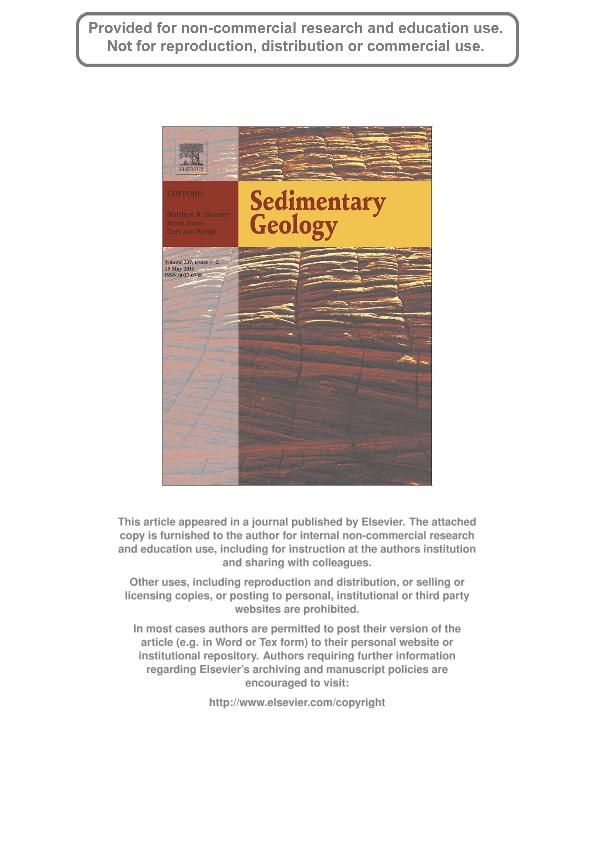Mostrar el registro sencillo del ítem
dc.contributor.author
Cuadrado, Diana Graciela

dc.contributor.author
Carmona, Noelia Beatriz

dc.contributor.author
Bournod, Constanza Naimé

dc.date.available
2017-07-14T17:35:12Z
dc.date.issued
2011-02
dc.identifier.citation
Cuadrado, Diana Graciela; Carmona, Noelia Beatriz; Bournod, Constanza Naimé; Biostabilization of sediments by microbial mats in a temperate siliciclastic tidal flat, Bahia Blanca estuary (Argentina); Elsevier Science; Sedimentary Geology; 237; 1-2; 2-2011; 95-101
dc.identifier.issn
0037-0738
dc.identifier.uri
http://hdl.handle.net/11336/20602
dc.description.abstract
Extensive microbial mats have been found in the siliciclastic tidal flats of the temperate Bahía Blanca estuary in the Atlantic coast of Buenos Aires province, Argentina. Several microbially induced sedimentary structures (MISS) occur especially in the upper intertidal and lower supratidal flats, among which the most conspicuous are erosional pockets, gas domes, microbial mat chips, and polygonal oscillation cracks. Biostabilization processes by epibenthic and endobenthic mats are also analyzed. Endobenthic mats occur in the upper intertidal area stabilizing ripples that despite the occurrence of severe storms persist in a fixed position for at least 2 months. Epibenthic mats occurring in the lower supratidal area also protect the substrate forming a thick microbial cover through the studied period. This thick cover was only affected by a strong storm that formed areas with erosional pockets and mat pieces. Nevertheless, the loose sediment within the erosional pockets was quickly colonized by microorganisms that developed a thin biofilm layer after a week. Changes in sediment accumulation were also recorded all over the upper tidal flat during a year, showing an important increase due to bioturbation activities of crabs. This situation also affected microbial mat growth, which evolved from a thin microbial biofilm into a thick, stratified microbial mat community in almost 2 years, mainly in the lower supratidal areas. The results of this study not only help us to better characterize the complex interactions between the microorganisms forming microbial mats, the tidal-flat sediment and the physical parameters that control this setting, but also have important implications for the understanding of analogous fossil sedimentary successions.
dc.format
application/pdf
dc.language.iso
eng
dc.publisher
Elsevier Science

dc.rights
info:eu-repo/semantics/openAccess
dc.rights.uri
https://creativecommons.org/licenses/by-nc-sa/2.5/ar/
dc.subject
Benthic Microbiota
dc.subject
Biotic-Physical Sediment Dynamics
dc.subject
Tidal Zone
dc.subject
Extracellular Polymeric Substances
dc.subject
Biostabilization
dc.subject.classification
Geología

dc.subject.classification
Ciencias de la Tierra y relacionadas con el Medio Ambiente

dc.subject.classification
CIENCIAS NATURALES Y EXACTAS

dc.title
Biostabilization of sediments by microbial mats in a temperate siliciclastic tidal flat, Bahia Blanca estuary (Argentina)
dc.type
info:eu-repo/semantics/article
dc.type
info:ar-repo/semantics/artículo
dc.type
info:eu-repo/semantics/publishedVersion
dc.date.updated
2017-07-13T17:23:06Z
dc.journal.volume
237
dc.journal.number
1-2
dc.journal.pagination
95-101
dc.journal.pais
Países Bajos

dc.journal.ciudad
Amsterdam
dc.description.fil
Fil: Cuadrado, Diana Graciela. Consejo Nacional de Investigaciones Científicas y Técnicas. Centro Científico Tecnológico Conicet - Bahía Blanca. Instituto Argentino de Oceanografía. Universidad Nacional del Sur. Instituto Argentino de Oceanografía; Argentina
dc.description.fil
Fil: Carmona, Noelia Beatriz. Consejo Nacional de Investigaciones Científicas y Técnicas. Centro Científico Tecnológico Conicet - Bahía Blanca. Instituto Argentino de Oceanografía. Universidad Nacional del Sur. Instituto Argentino de Oceanografía; Argentina
dc.description.fil
Fil: Bournod, Constanza Naimé. Consejo Nacional de Investigaciones Científicas y Técnicas. Centro Científico Tecnológico Conicet - Bahía Blanca. Instituto Argentino de Oceanografía. Universidad Nacional del Sur. Instituto Argentino de Oceanografía; Argentina
dc.journal.title
Sedimentary Geology

dc.relation.alternativeid
info:eu-repo/semantics/altIdentifier/doi/http://dx.doi.org/10.1016/j.sedgeo.2011.02.008
dc.relation.alternativeid
info:eu-repo/semantics/altIdentifier/url/http://www.sciencedirect.com/science/article/pii/S0037073811000625
Archivos asociados
